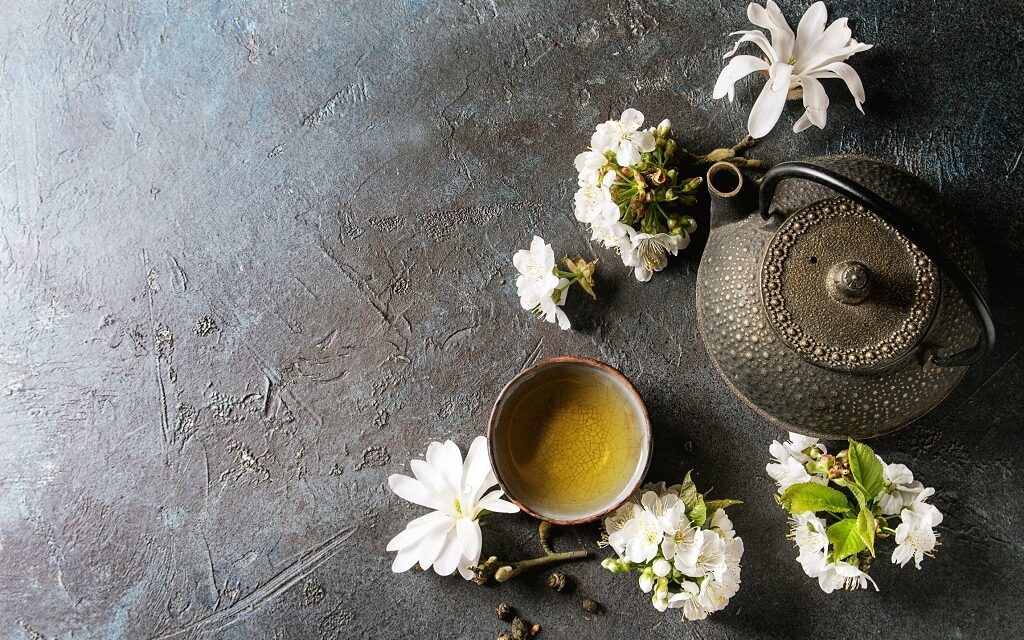Tea is the most widely consumed beverage in the world after water, and this will come as no surprise once learning more about its breadth of health benefits.
Cultures around the world are well versed in the many curative and preventative properties of various types of pure, organic tea leaves. In countries such as India, China, Japan, Indonesia, Morocco, South Africa, Burma – the list goes on – people view tea as a proven remedy for many ailments and maladies that westerners too often attempt to alleviate with synthetic pharmaceuticals.
In this article we explain the cultural importance and science behind a wide range of teas that have been scientifically documented as effectively delivering five powerful health benefits. Regardless of the wellness potential these teas can provide, keep in mind that they taste delicious, too!
Table of Contents
- Why Tea Is the Preferred Ceremonial Drink Around the World
- The Science Behind the Health Benefits of Tea
- 5 Health & Wellness Benefits of Tea
- How to Try These Unique Types of Tea from Around the World
- Atlas Tea Club Promo Code
Also see:
Why Tea Is the Preferred Ceremonial Drink Around the World
Tea has always had a history of being a ceremonial drink, whether it’s as a peace offering for warring kingdoms, or as a soothing elixir from ancient traditions, such as the regaled Japanese Tea Ceremony.
A brew of fresh, organic tea leaves, packed with nutrients has always been the go-to cure for reducing stress and anxiety, while promoting restful sleep. Thus, tea has always been the preferred libation for post prandial gatherings and sacred cultural ceremonies, as the ingredients promote good digestion, and overall good health and wellness.
Moroccan Mint Tea
The people of Morocco, for example, know that Moroccan Mint tea, with its anti-inflammatory menthol component, is a soothing after-dinner palliative. The menthol in the tea leaves, together with fluoride, magnesium, copper, and calcium, helps to boost immune functions.
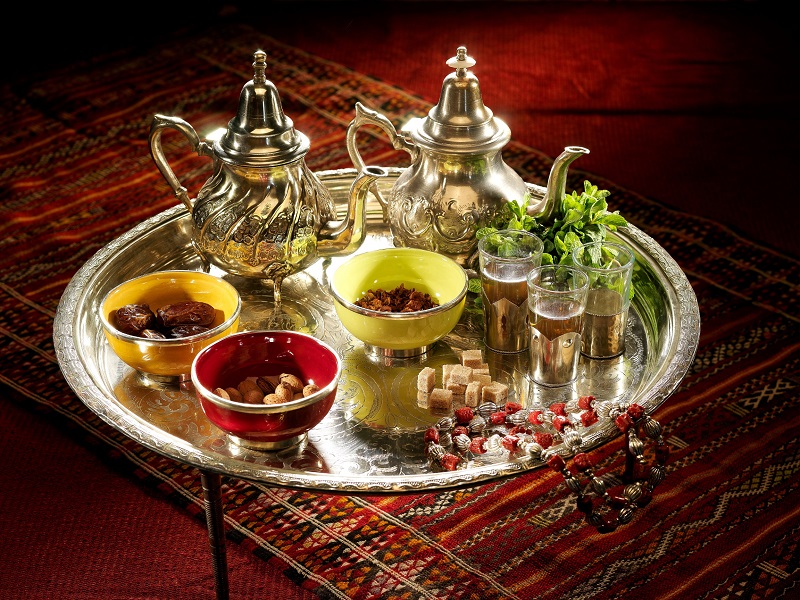
This simplistic after-dinner treat is able to kill off bacteria, viruses, and any fungi that you may have ingested during the course of the meal. The ceremonial pouring of the sticky, sweet liquid is one of our favorite traditional tea memories, and to this day we are huge fans of Moroccan Mint tea after a heavy meal.
When combined with green tea leaves, Moroccan mint tea can raise levels of a neurotransmitter, known as GABA that promotes calm, and creates feelings of relaxation, while reducing anxiety, stress, and fear.
Masala Chai
In India, meals are not complete until you have a milky tea concoction known as Masala Chai, literally translated as “spicy tea“. This after-dinner digestive is made with Assam, Darjeeling or Nilgiri black tea, and a variation of spices or “karha” such as ginger, cardamom, cinnamon, black pepper, nutmeg, allspice, and clove.
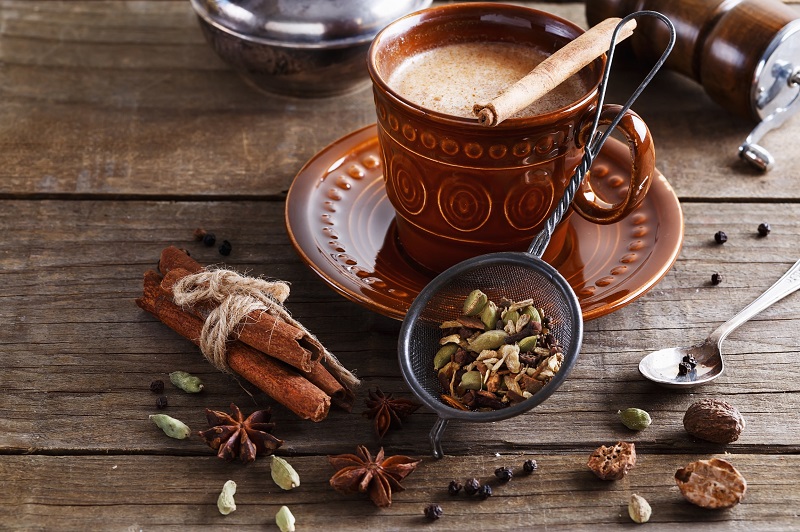
The spices serve as a “non-alcoholic digestif” after a meal that help improve circulation and deliver oxygen to various organs to help the digestion process. Ginger is an especially important component of masala chai, as it contains “gingerol“, which improves gastrointestinal motility. In other words, masala chai, with ginger, induces digestion and ensures that food does not linger in the gut causing a bloated feeling.
The Science Behind the Benefits of Tea
Different teas have different phytochemicals, polyphenols, vitamins, and minerals that can relieve many of the same issues as commercially manufactured drugs. Most importantly, tea is natural, with less chance of harmful side effects or dangerous interactions with other prescription drugs.
Medical evidence in both animal and human studies has confirmed the medicinal properties of tea leaves, suggesting that the polyphenolic compounds in black and green teas are beneficial for various ailments. These physiological effects of tea compounds include anti-aging, cardiovascular disease improvements, and even cancer prevention.
5 Health & Wellness Benefits of Tea
This section shares the types of teas that deliver the following health and wellness benefits and the underlying science:
- Teas that Alleviate Stress & Anxiety
- Teas that Burn Fat & Improve Metabolism
- Teas that Improve Memory & Cognitive Ability
- Teas to Improve the Immune System
- Teas for Improving Hair & Skin Issues
1. Teas that Alleviate Stress & Anxiety
Anxiety or a sense of fear can be alleviated by increasing GABA (Gamma-AminoButyric Acid), which is an inhibitory chemical messenger for the central nervous system. GABA helps certain conditions by slowing down your brain – you feel calmer and less stressed – by blocking specific signals to the central nervous system by increasing Dopamine and Serotonin. These two neurotransmitters are strongly linked to happiness and well-being.
Simply stated, teas that increase your GABA levels:
- Improve sleep
- Reduce anxiety, stress and fear
- Help alleviate depression
Teas that help alleviate stress and anxiety:
Also see:
Green Tea
The best teas for enhancing GABA levels are green teas such as Indonesia Twisted Leaf Green tea from the Banton region. Atlas Tea Club sources these leaves from a farm near a pristine national park, and the taste reflects the purity of the growing environment. Less earthy-tasting than a typical green tea, this tea is naturally sweet with aromas of cinnamon and apples.
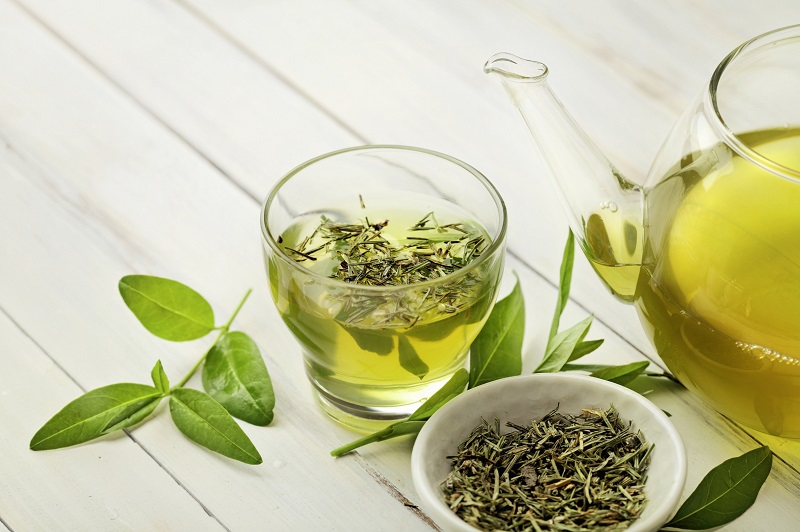
Also see:
Chamomile
Other teas that act on the central nervous system include Chamomile which is often considered an herb, as well as a tea. Chamomile can act as a mild tranquilizer or sleep inducer in much of the same way as green tea. By increasing GABA levels, serotonin, dopamine, and noradrenaline are elevated to provide calmness and reduce anxiety.
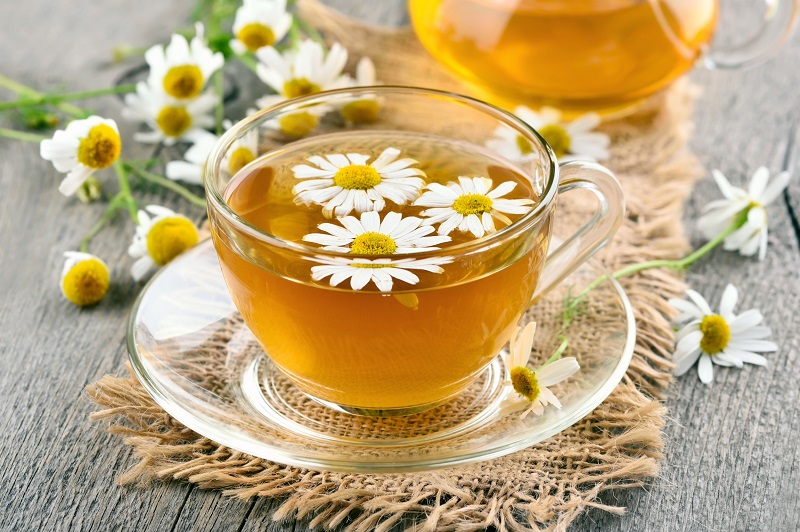
2. Teas that Burn Fat & Improve Metabolism
Teas that help burn fat and improve your metabolism:
Green Tea
As we age, our metabolism slows and makes it harder to lose weight and burn fat. Green tea, an oxidized or “non-fermented” leaf tea, has been heralded as a safe, economical way to burn fat and improve metabolism.
Despite common belief, green tea does contain caffeine. Together with a flavonoid called catechin, caffeine helps to speed up metabolism by breaking down excess fat. The combination of caffeine and catechin increases the body’s need for energy and thus promotes weight loss.
Rooibos
Although technically not a “tea”, Rooibos, which is derived from a South African shrub, is also a plant which imparts fat burning and metabolism properties. Its leaves are available as either fermented, which turns them reddish-brown, or non-fermented, which imparts a green color.
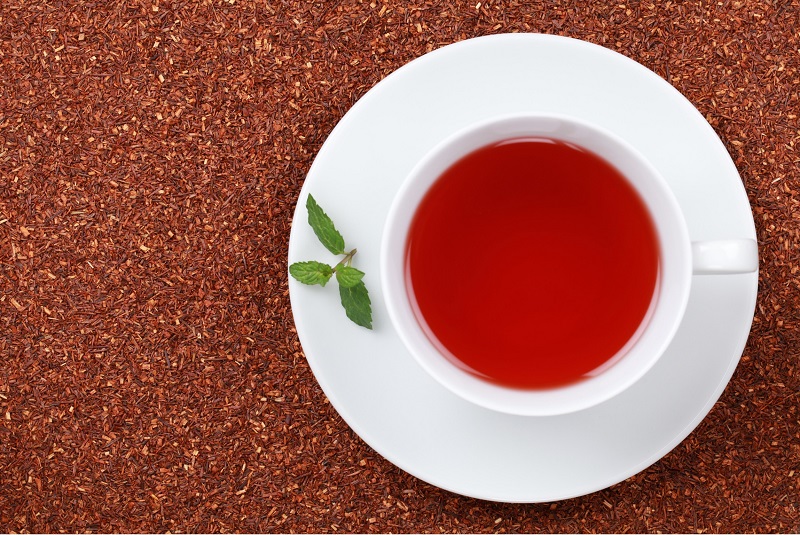
Officially classified as Aspalathus linearis, Rooibos leaves are often mistaken for “tea” or Camilla sinensis. However, unlike tea, Rooibos is an herb and not at all related to traditional black or green teas.
Despite this difference, fermented Rooibos exhibits the same effect on fat levels in the body as green tea. This has been attributed to rooibos’ high levels of polyphenols and flavonoids, both which are directly linked to reducing obesity. The mechanism of this action is that the compounds in Rooibos increase the body’s levels of leptin, which is a hormone that inhibits hunger and regulates energy balance.
Oolong
Oolong tea, which is a semi-fermented tea, is also known for its weight management properties. As a partially oxidized tea, Oolong is between green and black tea in color with a fruity aroma.
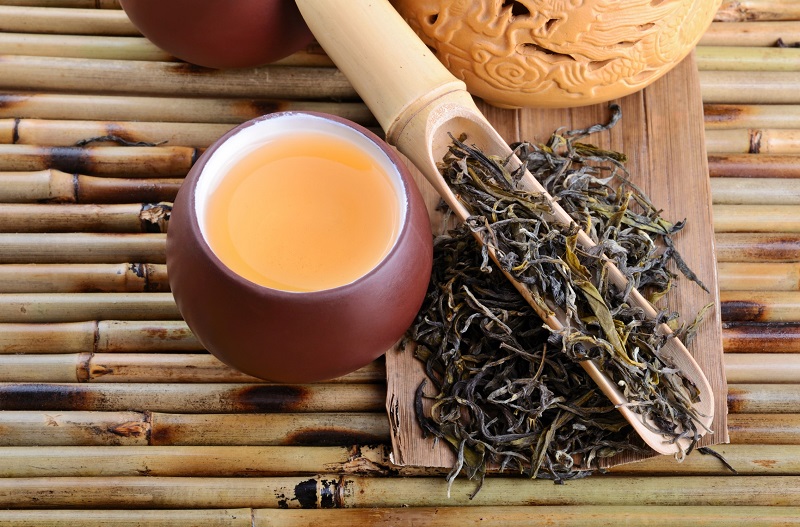
Human clinical studies have demonstrated that Oolong can enhance weight loss by improving fat burning and increasing metabolism due to its powerful ingredient profile of catechins, theaflavins, and other compounds which interfere with lipid or fat synthesis. Furthermore, these compounds help to inhibit fat transport and storage, suggesting they have a role in obesity and weight management.
3. Teas that Improve Memory & Cognitive Ability
Preserving our ability to think, analyze, process, and remember is a concern for anyone who wishes to maintain an active, healthy, and independent lifestyle as we age.
Teas that help improve memory, cognitive ability, while fighting dementia:
Also see:
Ashwagandha (White Cherry)
Indians have trusted the power of Ashwagandha, (AKA white cherry leaves), to maintain cognitive ability and improve memory, as it has been used in Ayurveda for centuries.
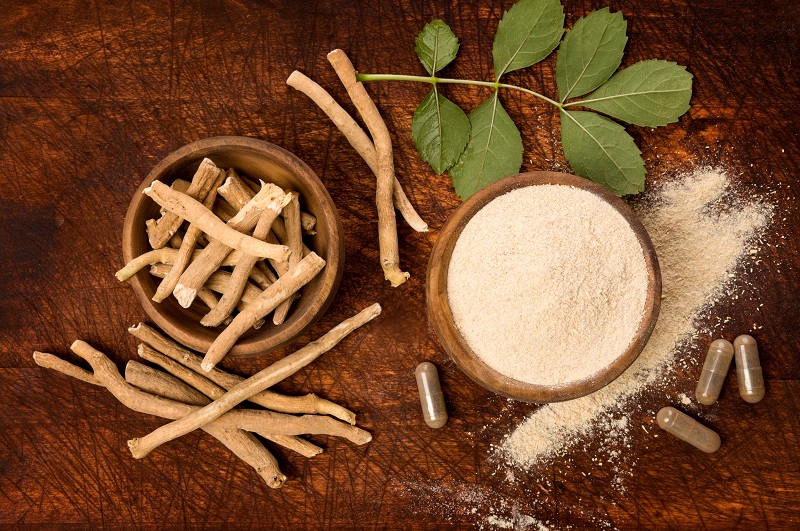
Commonly referred to as the “Indian Ginseng“, Ashwagandha or Withania somnifera is an adaptogenic herb, which means that it helps the body restore its natural balance, especially after stressful situations.
Ashwagandha has demonstrated, in randomized, placebo-controlled, double-blind human trials, that it supports cognitive functions in older adults with mild cognitive impairments. The active chemical components include alkaloids, steroidal lactones, and saponins, all of which are known to improve cognitive function.
Matcha
Matcha became all the rage in America back in 2011, as it was touted as a wonder leaf for curing everything. Although, that claim might be overstated, studies have illustrated that Matcha tea leaves contain brain-friendly compounds, such as catechins, or antioxidants, caffeine and L-theanine that boost cognitive functions by acting as vasodilators to increase the flow of oxygen to the brain.
Matcha enthusiasts also regale the tea for its ability to improve attention, memory and reaction time during athletic endeavors.
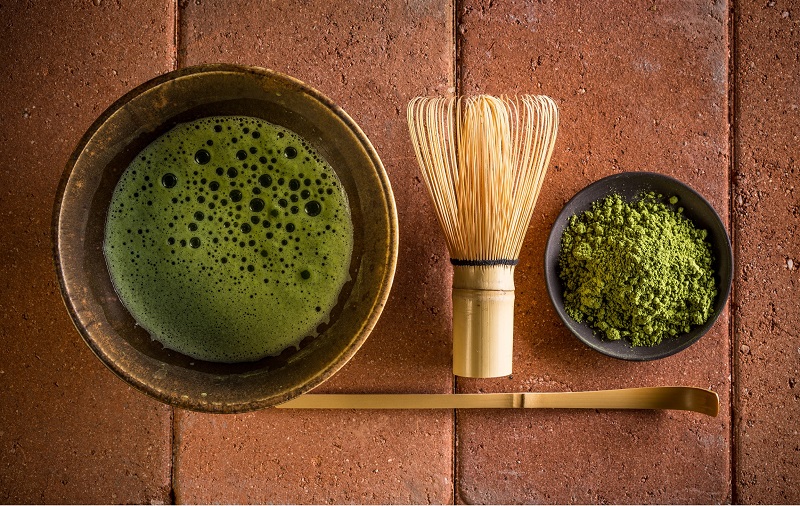
Green Tea
Green tea with its abundance of polyphenols, has a similar effect as Matcha, albeit at a lower rate. Matcha tea consumption results in a higher concentration of phytochemicals compared to regular green tea. In fact, the amount of antioxidant activity in Matcha tea is over 100 times more potent than regular green tea.
Ginger
Ginger or Zingiber officinale has always been our go to cure for all that ails us, so we were not surprised to discover a number of studies regarding ginger’s role in treating dementia.
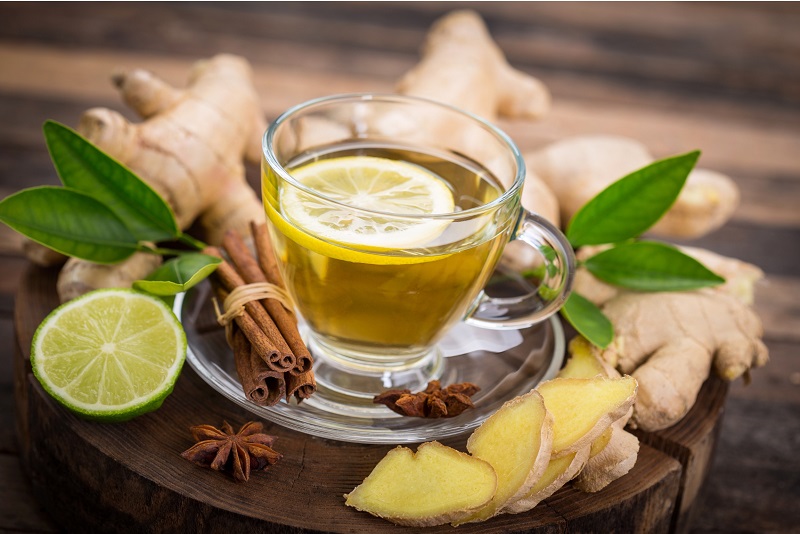
Ginger is actually a root, so once again “not technically tea leaves”, but it can be added to create a blissful concoction such as Tulsi Orange Ginger tea. Its use to treat dementia for centuries in South Asia has prompted researchers to consider that its main component 6-gingerol is a potent muscarinic.
Why is this important? In Alzheimer’s Disease, stimulation of muscarinic receptors is reduced. Thus, muscarinic compounds excite the brain’s receptors by activating a number of signaling pathways necessary for normal brain function.
Another ongoing study theorizes that ginger exhibits an ability to block an enzyme that is believed to play a crucial role in ongoing dementia, while exhibiting neuroprotective properties.
Turmeric
We are true believers in the potency of Turmeric, as we religiously consume 1000 milligrams as part of our daily morning breakfast ritual. Turmeric is rich in a compound known as Curcumin, which has proven to have a beneficial effect on Alzheimer’s patients.
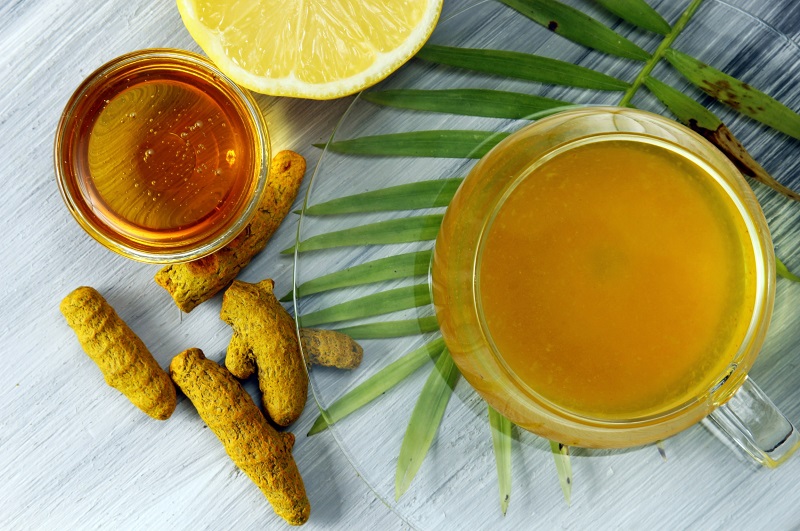
Alzheimer’s and other forms of dementia are said to be the result of:
- Oxidative Stress
- Free Radicals
- Abnormal Inflammatory Reactions, and
- Metal Toxicity
Curcumin is believed to delay the degradation of neurons, decrease plaques in the brain, remove harmful metals through chelation, and provide overall anti-inflammatory actions which improves the overall memory of Alzheimer patients.
Black Tea
Black tea, such as Shan Cha or Honey Scent Black, both from Thailand, has similar properties as Green and Matcha teas. Scientists have proven that black tea inhibits the activity of the enzyme, acetylcholinesterase (AchE), which is found in Alzheimer patients. This AchE breaks down a necessary neurotransmitter or chemical messenger in the brain called acetylcholine.
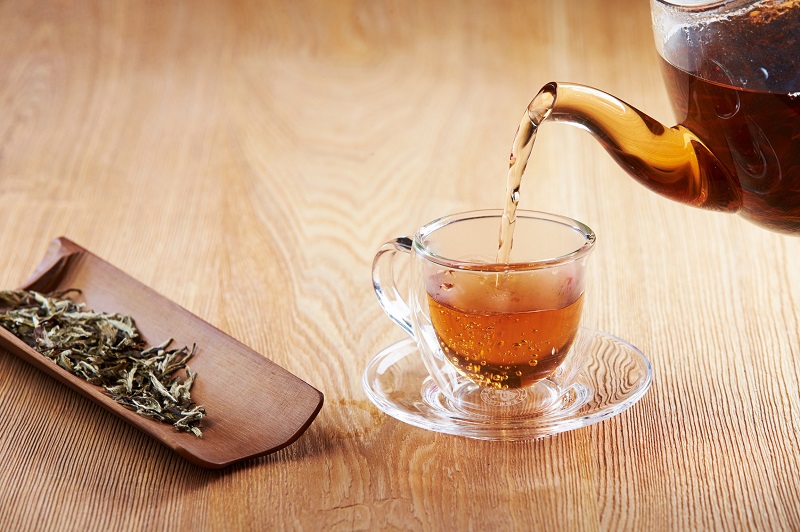
Black tea prevents the breakdown of acetylcholine by inhibiting AchE’s activity and thus acetylcholine destruction. Furthermore, black tea has been found to slow down the activity of another enzyme that is found in Alzheimer brain tissue, butyrylcholinesterase (BuChE).
4. Teas to Improve the Immune System
Staying healthy throughout the year is possible especially when augmenting your immune system with the right foods and beverages. Tea is very much a part of our wellness plan, as we are well aware of the antioxidant, antiviral, and antibacterial profile of some of the teas we drink.
Aside from providing ample hydration, which is a necessity for a fully-functioning immune system, tea is packed with natural flavonoids that help neutralize harmful free radicals in the body.
Herbal teas are the best source of immune fighting beverages, as they have natural additives, such as Eucalyptus, Citrus, Ginger, Tulsi and Nettles all of which have their own profiles with immune fighting ability.
Tea additives that help improve the immune system:
Also see:
Eucalyptus
Eucalyptus is known for its many benefits such as loosening phlegm, easing congestion, decreasing pain, and generally promoting relaxation in the body. The main component in Eucalyptus is Eucalyptol, a naturally produced ether that decreases the amount of cytokines in the body.
An overabundance of cytokines result in excess inflammation and an overaggressive immune response which may include fever, body aches, fatigue and nausea.
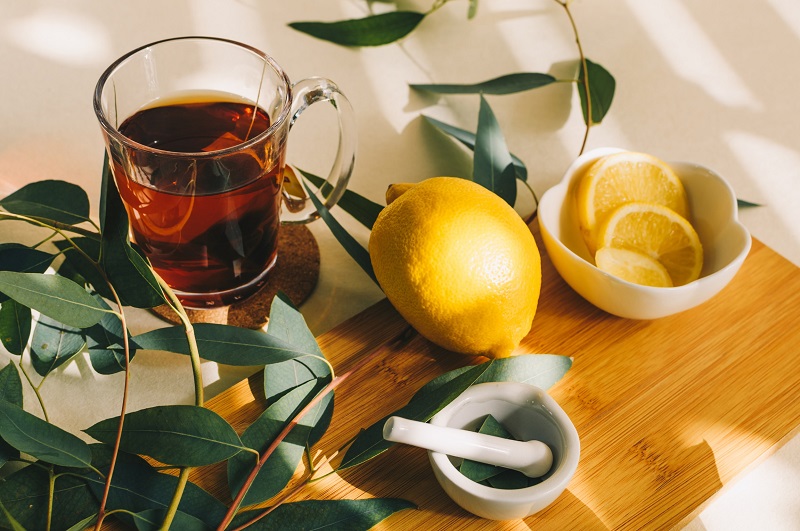
Citrus
We all know the importance of vitamin C for maintaining a healthy immune system, and what better way to get your daily dose than with a hot (or cold) brewed beverage. Vitamin C is a critical micronutrient that works with the body on a cellular level to help strengthen the immune system by fighting free radicals, decreasing inflammation and booting overall immunity.
Ginger
Gingerol is the perfect partner in this quest to strengthen the body’s immunity and defenses. It is a phenolic compound that has been widely studied and proven to have an array of biochemical activities on chronic ailments.
Many researchers have theorized that Gingerol inhibits the activation of enzymes such as protein kinase B and protein complexes, such as nuclear factor kappa B from producing an overabundance of inflammatory causing cytokines.
Tulsi Orange Ginger
Citrus and Ginger teas working in tandem are a wonderful complement, as with Tulsi Orange Ginger tea, as the combination imparts all natural benefits from each of the main components, Vitamin C and Gingerol, respectively.
Nettles
Nettles, or Urtica dioica, are an approach that are grandparents have taken to keep the body healthy. An herbaceous, perennial plant that can often be found growing wildly in the countryside, where soil is rich in nitrogen and phosphates, Nettles have demonstrated an ability to increase both red and white blood cells counts.
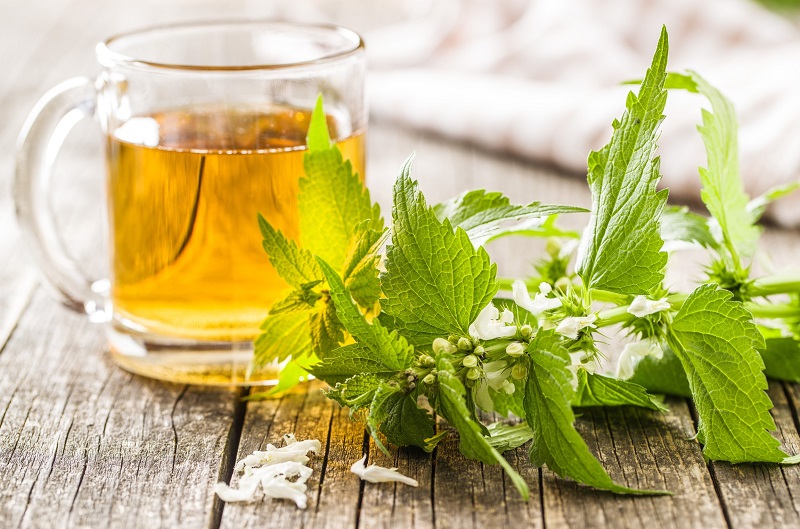
It is believed that the phenolic acids and flavonol glycosides present in the plant demonstrate selective inhibition on harmful enzymes, specifically cyclooxygenase and lipoxygenase that produce prostaglandins which promote fever, pain and inflammation in the body.
5. Teas for Improving Hair & Skin Issues
Teas that help improve hair and skin issues:
Hibiscus
The ideal tea will have the ability to rejuvenate the mind and body, while being a delicious refreshment either hot or cold. We discovered Hibiscus tea quite by accident one winter, as a local market was selling freshly dried leaves by the pound. Curious, we purchased about two pounds and sipped our way through the colder months to reveal improved skin tone and increased hair growth.
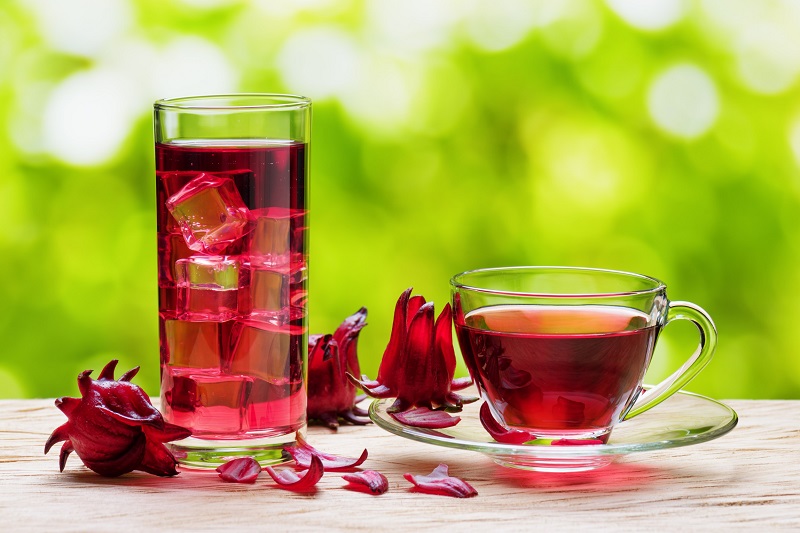
We researched this and discovered that Hibiscus flowers have anthocyanins and polyphenols, such as quercetin, that enhance the skin’s ability to maintain moisture. Our skin was well hydrated throughout the winter months with very little effort. Despite the dryness of our indoor environment due to heating, our usual winter dull, flaky, dry skin was nowhere to be found, and our hair was more manageable and growing faster than normal.
Hibiscus is rich in amino acids that nourish hair roots to keep strands strong, healthy, shiny and well nourished.
Eucalyptus
Similarly, Eucalyptus tea with its powerful compound eucalyptol, has been used to treat acne and other skin conditions. Eucalyptol boosts circulation and, as previously mentioned, is a powerful anti-inflammatory for the body capable of calming skin for a smoother appearance and healthy glow.
Lemongrass
Lemongrass has been used by Asians to promote hair growth, alleviate an itchy, dry scalp, and to firm or tighten facial skin. Packed with Vitamins A and C, lemongrass has been called a “wonder herb“, as more beauty manufacturers are adding it to their product formulations.
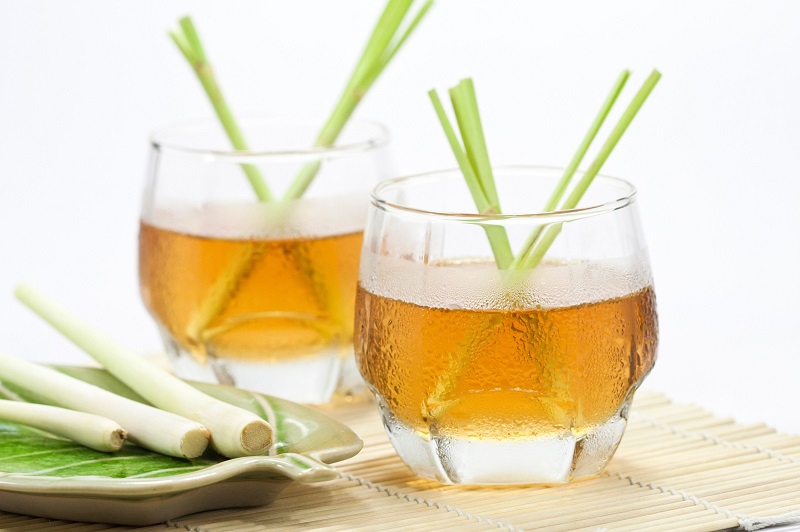
Sage
Sage is another tea that dips into “grandma’s secret recipes” for repairing damaged hair and skin, as it was often used to regenerate new hair follicles and improve scalp blood flow.
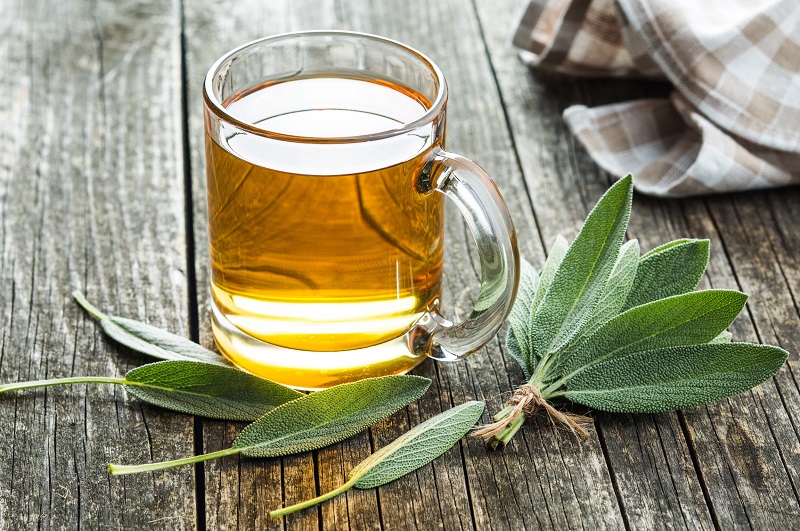
Used as a traditional herbal remedy in Ancient Greece and Rome, and by Native Americans and Chinese, sage, or Salvia officinalis, is high in antioxidants, and camphor, a compound known for its curative profile.
Camphor or Cinnamomum camphora is a terpene with a wide spectrum of curative properties. Commercial camphor is often made from turpentine, but the natural leaf form is safe as an antibacterial, antifungal and anti-inflammatory.
Green Tea
Green tea is once again a hero in the natural remedy category, this time for hair and skin repair. As we previously mentioned, Green tea’s powerful antioxidant, catechin and polyphenol profile makes it a treasure chest for repairing the body.
Polyphenols are great anti-bacterial elements that treat acne to reveal clean, toned, smoother skin. Strong antioxidants in green tea play a role in maintaining collagen levels which give the skin a firmer more youthful appearance.
Catechins in green tea promote healthy hair and hair loss, as it has been observed to block dihydrotestosterone (DTH), a major cause of hair loss and baldness.
How to Access High Quality Tea from Around the World
There are a number of tea types grown around the world that have numerous health benefits based on their chemical composition. The best tea leaves are organic, fresh, and pure, traits often unavailable in grocery store stock.
Curated tea subscriptions are a highly convenient way to experience teas from around the world and to test their therapeutic benefits on an on-going basis. Finding teas of the same quality and purity as those in tea subscription clubs, would likely be a challenging and impractical endeavor if you searched your neighborhood markets.
If you’re interested in learning more about the wellness properties of tea from far-reaching parts of the world, a tea subscription service, such as Atlas Tea, is an ideal option. Teas delivered to your front door enable you access to some of the most interesting and exotic teas from around the world, while offering you fresh leaves from small, organic tea farms from lesser-known tea growing regions.
Atlas Tea’s tea subscription service differentiates itself by focusing on the freshness and purity of the leaf crops it offers. This approach is critical in order to delivery high quality tea leaves with vibrant flavor, and naturally enhanced wellness benefits. A recurring subscription is ideal as the service can rotate its offerings based on when small batches of leaves are available for optimum consumption and enjoyment.
Each month features two unique teas “that you won’t find anywhere else” with flavor notes, a country postcard, and steeping tips, giving you a sense of international travel that you can touch, smell and taste without ever leaving home.

Each monthly shipment includes:
- A curation of the world’s finest loose leaf tea
- Unique single-origin teas curated from the best farms across the world
- Tea delivered at peak freshness to provide farm-to-cup purity
- Two premium loose leaf teas, enough to make 30+ cups of tea
- Picturesque postcard from the featured country
- Country card with steeping tips and flavor notes
- Compostable tea filters for easy steeping
- Free Shipping (applies to US-only)
Also see:
Tea Tips
Make sure to discard your spent or used tea leaves in your garden or in your houseplant pots. Tea leaves, especially green tea leaves, are packed with nitrogen and are the perfect organic matter for composting your garden and houseplants.
To enhance both the flavor and wellness potency of tea, also experiment with additional beneficial ingredients, such as:
- Fresh ginger
- Honey
- Lemon juice
- Cloves
- Mint leaf
- Turmeric
- Cinnamon
- Orange peel
- Oregano
- Tulsi leaf
Atlas Tea Club Promo Code
For any purchases with Atlas Tea Club, be sure to use the PURGULA50 discount promo code, to receive a 50% discount on your first month’s subscription, as well as a $7 discount on tea subscription gifts.
Additional Health & Home Wellness Articles
- 8 Wellness Design Tips for Your Kitchen & Bath
- How to Assess and Improve the Indoor Air Quality of Your Home
- How to Create an Allergy-Free Environment in Your Home
- Sanitize Your Home with Light Fixtures – Yes, Light Fixtures!
- UV-C Products to Make Your Home Healthier & Virus Free
- Aging In Place Renovations that Add Value to Your Home
- Are Smart Meters Harmful to Your Health?
| Purgula is reader-supported. When you click on links to other sites from our website, we may earn affiliate commissions, at no cost to you. If you find our content to be helpful, this is an easy way for you to support our mission. Thanks! Learn more. |

